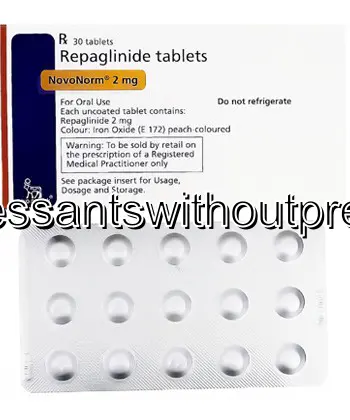| Package | Dosage | Price | Price per Dose | |
|---|---|---|---|---|
| Dosage: 0,5mg | ||||
| 360 pill | 0,5mg | NZD622.49 | NZD1.73 | |
| 180 pill | 0,5mg | NZD327.47 | NZD1.81 | |
| 120 pill | 0,5mg | NZD221.91 | NZD1.84 | |
| 90 pill | 0,5mg | NZD173.20 | NZD1.92 | |
| 60 pill | 0,5mg | NZD121.77 | NZD2.03 | |
| 30 pill | 0,5mg | NZD73.05 | NZD2.44 | |
| Dosage: 1mg | ||||
| 360 pill | 1mg | NZD993.30 | NZD2.76 | |
| 180 pill | 1mg | NZD516.93 | NZD2.87 | |
| 120 pill | 1mg | NZD362.66 | NZD3.03 | |
| 90 pill | 1mg | NZD300.41 | NZD3.33 | |
| 60 pill | 1mg | NZD205.67 | NZD3.41 | |
| 30 pill | 1mg | NZD121.77 | NZD4.03 | |
| Dosage: 2mg | ||||
| 360 pill | 2mg | NZD1,588.75 | NZD4.41 | |
| 180 pill | 2mg | NZD828.19 | NZD4.60 | |
| 120 pill | 2mg | NZD562.95 | NZD4.68 | |
| 90 pill | 2mg | NZD443.86 | NZD4.93 | |
| 60 pill | 2mg | NZD311.23 | NZD5.17 | |
| 30 pill | 2mg | NZD175.90 | NZD5.90 | |

Repaglinide Description
Overview of Repaglinide
Repaglinide is a medication commonly prescribed to help manage blood sugar levels in individuals with type 2 diabetes. It belongs to a class of drugs known as meglitinides, which work by stimulating the pancreas to produce more insulin. This mechanism helps to control post-meal blood glucose spikes, making it an effective option for many patients. Repaglinide is usually taken before meals, aligning medication intake with meal times to optimize its efficacy. Its rapid onset and short duration make it a popular choice for those needing quick control of blood sugar levels after eating.
Benefits and Effectiveness
One of the main benefits of Repaglinide is its ability to rapidly lower blood glucose levels when taken correctly. Patients often find it convenient because it allows flexibility with meal timings, and doses can be adjusted based on meal size and dietary habits. Repaglinide also works well for individuals who experience unpredictable eating schedules, providing more control over blood sugar fluctuations. Many patients report improved glycemic control when using Repaglinide as part of their diabetes management plan. It can be used alone or in combination with other antidiabetic medications, offering versatility in treatment options.
Side Effects and Precautions
Like all medications, Repaglinide may cause side effects in some users. Common adverse reactions include hypoglycemia, which manifests as shakiness, sweating, dizziness, or hunger. Since Repaglinide stimulates insulin production, improper dosing or skipping meals can increase the risk of low blood sugar. Other possible side effects include weight gain, headache, or gastrointestinal discomfort. Patients are advised to monitor their blood sugar levels regularly and follow their healthcare provider’s dosing instructions carefully. People with liver impairment or advanced kidney disease should use Repaglinide with caution, and it is essential to inform the physician about all current medications to avoid interactions.
Usage Tips and Considerations
Proper administration is key to maximizing the benefits of Repaglinide. It should be taken within 30 minutes before a meal to ensure optimal absorption and insulin release. Skipping meals or delaying intake may increase the risk of hypoglycemia, so patients must adhere to their prescribed schedule. It’s also important to combine this medication with a balanced diet and regular physical activity for best results. Patients should not adjust doses on their own but consult their healthcare providers for any changes. Regular blood glucose monitoring helps track the medication’s effectiveness and identify any adverse effects early.
Conclusion
Repaglinide is a valuable medication for managing post-meal blood sugar spikes in type 2 diabetes. Its fast action and flexibility offer benefits to many patients, particularly those with irregular eating habits. However, careful attention to dosing and meal timings is essential to avoid complications such as hypoglycemia. Patients should work closely with their healthcare providers to ensure safe and effective use of this medication as part of a comprehensive diabetes management plan. Monitoring and adherence are crucial for achieving optimal health outcomes with Repaglinide.
